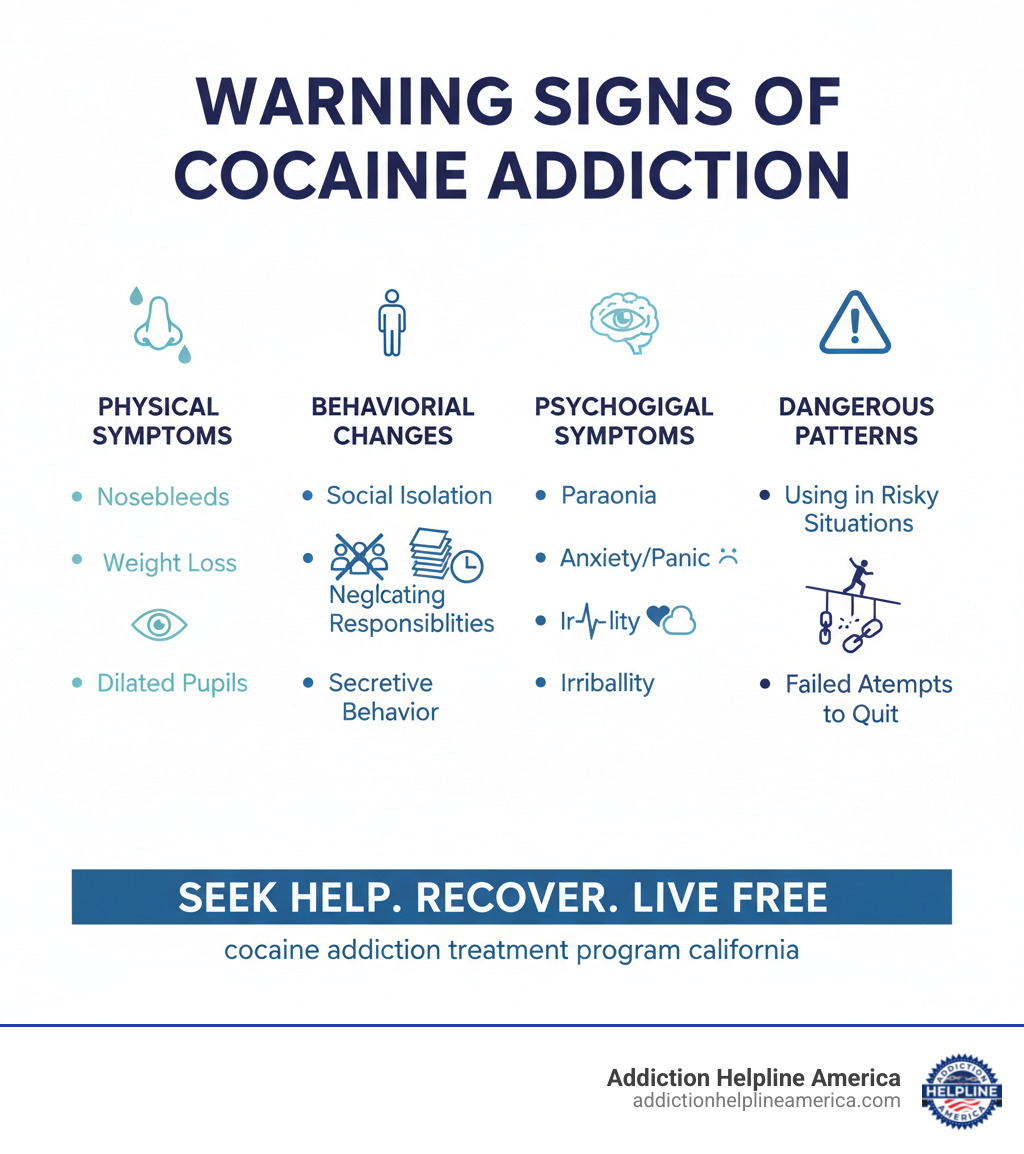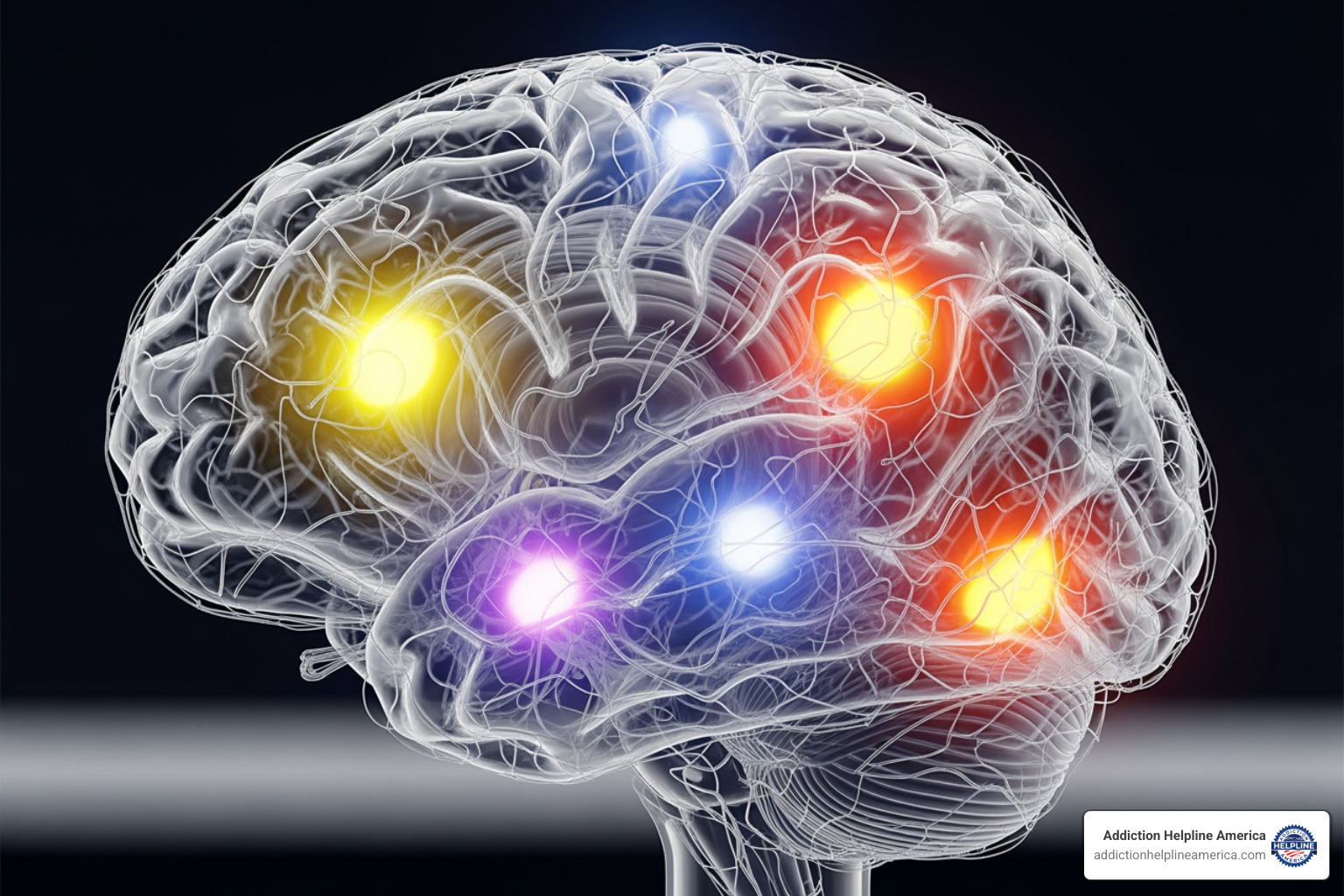
Understanding the Urgent Need for Effective Treatment
A cocaine addiction treatment program california offers comprehensive, evidence-based care to help individuals break free from stimulant abuse. These programs address the severe physical and mental health effects of cocaine, a potent stimulant that can lead to heart disease, stroke, seizures, and profound mental distress like paranoia and depression.
Key components of these programs include:
- Medical detoxification for safe withdrawal management.
- Residential/inpatient treatment for intensive therapy in a structured setting.
- Outpatient programs (IOP/PHP) for flexible therapeutic support.
- Dual diagnosis treatment for co-occurring mental health disorders.
- Evidence-based therapies like CBT and motivational interviewing.
- Holistic approaches such as yoga, meditation, and mindfulness.
- Aftercare support to prevent relapse.
The statistics are sobering. In 2021, 24,486 individuals died from cocaine-involved overdoses, with many of those deaths also involving synthetic opioids like fentanyl. This highlights the growing danger of drug mixing and the urgent need for intervention.
California is a leading state for addiction treatment, hosting hundreds of facilities equipped to provide personalized, compassionate care. Whether you’re struggling with powder or crack cocaine, professional treatment can help you reclaim your life by offering a full continuum of care, from detox to long-term aftercare. Many facilities also specialize in treating co-occurring disorders, recognizing that addiction often stems from underlying issues like anxiety, depression, or trauma.
At Addiction Helpline America, we connect individuals with the right resources, providing confidential support to help you steer your options and find a program that meets your unique needs.

Basic cocaine addiction treatment program california glossary:
Understanding Cocaine Addiction: Signs, Dangers, and Long-Term Effects
Cocaine, a Schedule II substance, floods the brain’s reward system with dopamine, creating an intense but short-lived euphoria. The subsequent crash brings fatigue, irritability, and an overwhelming urge to use again. This rapid cycle from high to low is what makes cocaine so addictive, leading to a condition known as stimulant use disorder or cocaine use disorder.

The Dangers and Signs of Cocaine Use
Recognizing the warning signs of cocaine use is the first step toward getting help. While initial effects like increased energy and confidence may seem appealing, they quickly give way to troubling changes.
Call Now – Your Journey to Recovery Begins Today!

Take the first step towards a healthier life! Call now to connect with our compassionate team and start your recovery journey today. Your path to healing awaits!
Our recovery specialists are available 24/7 to provide support, and all calls are confidential and free. Reach out anytime – we’re here to help!
Common signs include:
- Unusual restlessness, agitation, or overconfidence leading to poor decisions.
- Noticeable weight loss due to appetite suppression.
- Financial problems and neglecting responsibilities at work, school, or home.
- Social withdrawal and isolation as the drug becomes a priority.
- Paranoia, anxiety, irritability, or panic attacks, especially during the comedown.
- Repeated, failed attempts to cut back or quit.
Cocaine poses immediate, life-threatening physical dangers. It puts immense stress on the cardiovascular system, increasing the risk of heart attack and stroke, even in young, healthy individuals. Seizures and sudden death from cardiac arrest are also real possibilities. The method of use carries specific risks: snorting damages the nasal septum, smoking harms the lungs, and injecting raises the risk of HIV and Hepatitis C.
A modern danger is the lacing of cocaine with other substances, particularly fentanyl. In 2021, over 15,000 cocaine-involved overdose deaths also involved synthetic opioids. This makes every use a gamble, reinforcing the need for a life-saving cocaine addiction treatment program california.
Why People Self-Medicate with Cocaine
Many people turn to cocaine not for recreation, but to escape emotional pain. The drug’s euphoric effects can feel like a temporary solution for underlying issues like anxiety, depression, or trauma. This act of self-medication creates a vicious cycle: cocaine may briefly numb the pain, but it ultimately worsens the underlying mental health condition. The brain adapts, requiring the drug to feel any pleasure, and the original anxiety or depression intensifies. This is why integrated treatment that addresses both addiction and mental health is so critical.
Long-Term Effects of Cocaine Abuse
Chronic cocaine use causes widespread damage to the body and brain.
- Cardiovascular System: Chronic high blood pressure and a weakened heart muscle lead to a persistent risk of heart attacks and strokes.
- Organ Damage: The liver and kidneys struggle to process toxins, leading to damage. The digestive system can suffer from ulcers and tears.
- Brain Changes: Cognitive functions like memory, concentration, and decision-making become impaired. The brain’s structure changes, affecting mood and behavior and increasing the risk of seizures and movement disorders.
- Mental Health: Anxiety, depression, and paranoia worsen, sometimes leading to psychosis or suicidal thoughts.
- Malnutrition: Appetite suppression leads to a depletion of essential nutrients.
Fortunately, a comprehensive cocaine addiction treatment program california can help reverse many of these effects. The body and brain begin to heal once use stops, and treatment focuses on restoring physical health, cognitive function, and addressing the root causes of addiction.
Recovery is about rebuilding your health and your future, and it is within reach.
How a Cocaine Addiction Treatment Program in California Works
Understanding how a cocaine addiction treatment program california works can ease the uncertainty of seeking help. California’s treatment landscape offers a continuum of care, meaning programs are designed to meet you where you are and adapt as you progress. At the core of this system is individualized treatment planning, which tailors the recovery path to your specific history, challenges, and goals, significantly improving your chances of success.

The First Step: Accessing Treatment Services
Reaching out for help is a courageous act. The process typically begins with a confidential initial assessment where professionals gather information about your use patterns, physical and mental health, and support system. This is not about judgment; it’s about creating an effective plan.
During this phase, you’ll also handle practical steps like insurance verification. The Affordable Care Act requires most private insurance plans to cover substance abuse treatment, and many California facilities also accept Medicaid (Medi-Cal) or offer payment plans. At Addiction Helpline America, we can verify your benefits for free to find programs within your budget.
Finding the right facility involves considering the level of care needed, treatment philosophy, and environment. The California Department of Health Care Services (DHCS) provides a directory of Licensed Treatment and Recovery Services to help you find reputable providers.
Levels of Care for Cocaine Addiction
Treatment is not one-size-fits-all. Different levels of care offer varying degrees of structure and support.
- Medical Detoxification: Provides 24/7 medical supervision in a safe environment to manage withdrawal symptoms. This is often the first step.
- Inpatient or Residential Treatment: Involves living at a facility for 30-90 days for immersive, intensive therapy away from daily triggers.
- Partial Hospitalization Programs (PHP): A step-down from residential care, offering structured day treatment while you live at home or in sober living.
- Intensive Outpatient Programs (IOP): Provides more flexibility, with therapy sessions a few times per week, allowing you to maintain work or school schedules.
- Traditional Outpatient Programs: Offers the least intensive care, often used as a final step-down to support long-term recovery.
- Sober Living and Aftercare: These are critical for long-term success, providing a structured, drug-free living environment and ongoing support after formal treatment ends.
The Role of Medically Supervised Detox
When you stop using cocaine, you will experience withdrawal. While not typically life-threatening, the symptoms can be psychologically distressing, making medically supervised detox invaluable. The acute phase of withdrawal usually lasts several days to a week.
Common symptoms include:
- Crushing fatigue and excessive sleepiness.
- Intense cravings for cocaine.
- Severe depression, anxiety, and an inability to feel pleasure (anhedonia).
- Agitation, irritability, and unpleasant dreams.
Currently, there are no FDA-approved medications specifically for cocaine withdrawal. However, medical professionals provide crucial supportive care. This includes ensuring you are in a safe, comfortable environment, providing nutritional support, and sometimes prescribing medications to manage severe anxiety or depression. The goal of detox is to stabilize you physically and emotionally, preparing you for the deeper psychological work of rehabilitation.
Therapies and Approaches in California Cocaine Rehabs
After detox, the real work of recovery begins. A cocaine addiction treatment program california uses a mix of evidence-based therapies and holistic approaches to heal the whole person—mind, body, and spirit. The goal is to understand the root causes of addiction and build the skills needed for a life free from substance use.
Call Now – Your Journey to Recovery Begins Today!

Take the first step towards a healthier life! Call now to connect with our compassionate team and start your recovery journey today. Your path to healing awaits!
Our recovery specialists are available 24/7 to provide support, and all calls are confidential and free. Reach out anytime – we’re here to help!
Evidence-Based Behavioral Therapies
These therapies are the cornerstone of effective treatment, providing practical tools for changing the patterns that fuel addiction.
- Cognitive-Behavioral Therapy (CBT): Helps you identify negative thought patterns that lead to drug use and develop healthier coping skills to manage triggers and cravings.
- Motivational Interviewing (MI): A client-centered approach where a therapist helps you find your own motivation for change, which is especially useful for those feeling ambivalent about recovery.
- Contingency Management (CM): Provides tangible rewards (like vouchers) for positive behaviors, such as passing drug tests, to reinforce the benefits of staying clean.
- The Matrix Model: A structured, 16-week program designed specifically for stimulant addiction that combines CBT, family education, counseling, and 12-step encouragement. Many California professionals receive specialized Training in the Matrix Model® to deliver this protocol.
These therapies are delivered through individual, group, and family sessions for comprehensive support.
The Importance of a Dual Diagnosis Cocaine Addiction Treatment Program in California
Addiction rarely occurs in isolation. Many people with cocaine use disorder also struggle with mental health conditions like anxiety, depression, or PTSD. Using cocaine can feel like a temporary escape from these issues, but it ultimately makes them worse. Trying to quit cocaine without addressing the underlying mental health condition often leads to relapse.
This is why a dual diagnosis cocaine addiction treatment program in California is so vital. These integrated programs treat the addiction and the co-occurring mental health disorder simultaneously. A coordinated team provides specialized therapies and medication management to address both issues, dramatically reducing relapse risk and building a strong foundation for lasting recovery.
Holistic and Supportive Therapies
Beyond behavioral therapies, top California programs incorporate holistic approaches to support overall well-being.
Family therapy helps heal relationships damaged by addiction, improving communication and building a supportive home environment. Group therapy and peer support provide a powerful connection with others who understand the struggle, reducing isolation and fostering a sense of community. Other supportive therapies include:
- Mindfulness and meditation to manage stress and cravings.
- Nutritional counseling to restore physical health and energy.
- Yoga and exercise to reduce stress and improve mood naturally.
- Creative arts therapies to provide alternative outlets for expression.
- Advanced approaches like neurofeedback or TMS to help regulate brain activity.
Together, these therapies create a comprehensive healing environment that supports every aspect of your recovery journey.
Finding the Right Program and the Benefits of Recovery
Choosing the right cocaine addiction treatment program california is a critical step toward lasting success. With hundreds of options available, finding a program that fits your unique needs is key. Committing to treatment is about more than just stopping drug use; it’s an opportunity to rebuild your health, repair relationships, and create a life you are excited to live.
How to Find the Right Cocaine Addiction Treatment Program in California
When searching for a program, consider these key factors to ensure quality care:
- State Licensing: The facility should be licensed by the California Department of Health Care Services (DHCS), which ensures it meets safety and quality standards.
- Accreditations: Look for accreditations from The Joint Commission (JCAHO) or CARF, which indicate a commitment to excellence and evidence-based practices.
- Staff Qualifications: The team should include certified addiction counselors, licensed therapists, and medical professionals with expertise in addiction.
- Treatment Philosophy: Find a program whose approach—whether 12-step, clinical, holistic, or a blend—resonates with your personal beliefs.
- Location and Environment: Decide if you would thrive in a peaceful, rural setting or an accessible urban one, and whether staying close to home or seeking distance from triggers is better for you.
- Specialized Programs: If you have a co-occurring mental health condition, a dual diagnosis program is essential. Other specializations may include gender-specific or age-specific tracks.
This table can help you compare the main program types:
| Feature | Inpatient/Residential Treatment | Outpatient Programs (IOP/PHP) |
|---|---|---|
| Environment | 24/7 supervision in a drug-free, structured living facility | Live at home while attending scheduled treatment sessions |
| Intensity | High: immersive therapy with daily structured activities | Moderate to High: regular therapy sessions multiple times per week |
| Duration | Typically 30, 60, or 90 days (sometimes longer) | Several weeks to several months |
| Best For | Severe addiction, unstable home environment, need for medical supervision, dual diagnosis | Moderate addiction, strong home support system, stable living situation |
| Cost | Generally higher due to around-the-clock care and housing | Generally lower, with more payment flexibility |
| Daily Activities | Individual and group therapy, holistic activities, skill-building workshops, recreational therapy | Individual and group therapy, relapse prevention education, some flexibility for work or school |
At Addiction Helpline America, we offer free, confidential guidance to help you sort through these options and connect you with a trusted program that fits your needs.
Key Benefits of Attending a Cocaine Rehab Program
Entering a cocaine addiction treatment program california offers life-changing benefits that extend far beyond sobriety.
- A Structured, Supportive Environment: Rehab provides a safe, drug-free space away from daily triggers, allowing you to focus completely on healing.
- Professional Guidance: You’ll work with a multidisciplinary team of doctors, therapists, and counselors who provide expert, individualized care.
- Peer Support Community: Connecting with others who share similar struggles creates a powerful, judgment-free support network that can last a lifetime.
- Healthy Coping Mechanisms: Treatment teaches you practical skills to manage stress, cravings, and difficult emotions without turning to substances.
- Addressing Root Causes: Therapy helps you explore and heal the underlying issues—like trauma or anxiety—that contributed to your addiction.
- Improved Physical and Mental Health: Your body and brain begin to heal, leading to better sleep, more energy, and a significant reduction in anxiety and depression.
- Relapse Prevention Strategies: You’ll develop a personalized aftercare plan to steer challenges and maintain long-term sobriety.
Recovery empowers you to reclaim your life, rebuild relationships, and create a future filled with possibility.
Frequently Asked Questions about Cocaine Treatment in California
Considering a cocaine addiction treatment program california naturally brings up questions about cost, duration, and methods. Here are clear, honest answers to some of the most common concerns.
How long does a cocaine rehab program usually last?
The length of treatment is personalized and depends on factors like the severity of addiction and the presence of co-occurring disorders.
- Medical detox typically lasts a few days to a week.
- Inpatient or residential programs commonly run for 30, 60, or 90 days. Longer stays are often recommended for more severe cases to build a stronger foundation for recovery.
- Outpatient programs (PHP/IOP) can last from several weeks to a few months, with treatment intensity gradually decreasing as you progress.
- Aftercare is a long-term commitment, with ongoing therapy and support groups often continuing for months or even years to maintain sobriety.
Completing the full recommended duration of a program significantly increases the chances of long-term success.
Does insurance cover cocaine addiction treatment in California?
Yes, most insurance plans cover cocaine addiction treatment. The Affordable Care Act and the Mental Health Parity and Addiction Equity Act mandate that addiction treatment be covered as essential healthcare.
- Private insurance is accepted by most rehab facilities in California.
- Medi-Cal (California’s Medicaid program) also covers addiction treatment services for eligible residents.
- Medicare may cover certain services for those 65 or older.
If you are uninsured or underinsured, many facilities offer self-pay options, sliding scale fees based on income, or payment plans. Don’t let cost be a barrier.
At Addiction Helpline America, we offer a free, confidential service to verify your insurance benefits. We can help you understand your coverage and connect you with programs that fit your financial situation.
Are there medications used to treat cocaine addiction?
Currently, there are no FDA-approved medications specifically designed to treat cocaine addiction or eliminate cravings. This makes behavioral therapies the primary treatment modality.
However, medications play a crucial supportive role. During detox, doctors may prescribe medications to manage difficult withdrawal symptoms like severe anxiety, depression, or insomnia. More importantly, medications are often essential for treating co-occurring mental health disorders. Using antidepressants or mood stabilizers to manage underlying conditions like depression or bipolar disorder can significantly reduce the urge to self-medicate with cocaine.
While researchers continue to explore potential medications, the most effective path to recovery today combines evidence-based behavioral therapies with supportive medical care when needed.
Call Now – Your Journey to Recovery Begins Today!

Take the first step towards a healthier life! Call now to connect with our compassionate team and start your recovery journey today. Your path to healing awaits!
Our recovery specialists are available 24/7 to provide support, and all calls are confidential and free. Reach out anytime – we’re here to help!
Conclusion
If you are reading this, you have already taken a courageous step toward change. Overcoming cocaine addiction is a challenging journey, but recovery is not only possible—it’s happening every day for people across California.
The state offers a diverse landscape of dedicated treatment centers, from intensive residential programs to flexible outpatient care. Whether you need help for addiction alone or a dual diagnosis treatment program for a co-occurring mental health condition, there is a path for you.
We’ve covered the signs of addiction, the process of treatment, and the therapies that work. But the most important message is this: you do not have to do this alone. The questions and fears you have are normal, and help is available to guide you through them.
That’s why Addiction Helpline America exists. We provide free, confidential, and personalized guidance to help you find the right cocaine addiction treatment program california for your needs. There is no judgment or pressure—just honest support from people who care. We can help you verify insurance, explore options, and connect with a facility that feels right.
A healthier, happier future is waiting. Take the next step.
Find the right California drug rehab program for you and begin your journey toward the life you deserve.
Our helpline is 100%
free & confidential
If you or someone you care about is struggling with drug or alcohol addiction, we can help you explore your recovery options. Don’t face this challenge alone—seek support from us.
Programs
Resources
Will my insurance
cover addiction
treatment?
We're ready to help
Find the best
drug or alcohol treatment
center
Are you or a loved one struggling with addiction? Call today to speak to a treatment expert.















